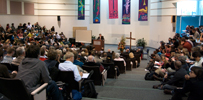
Gustavo Santos
Current Student
(MA, Marketplace Theology)
How I Got Here
After ten years in the marketplace, I realized that I was looking for my happiness in my career. Without knowing it, I had somehow created an idol. I was looking for my happiness, my fulfillment, in my career—even though I was using words like vocation, and calling. I was thinking, “If I find the perfect job, I can be happy—I will have the life, abundant life, that Jesus promises.” I didn’t realize that, actually, I was looking for the right thing in the wrong place.
More on Gustavo's journey to Regent...
At some point I was reading the Bible—which is something dangerous, sometimes!—and I saw the passage in which Jesus is sending out the disciples, and he says, “whoever wants to find their lives will lose it, and those who lose it for my sake will find it.” You know when a text kind of pops up, and you say, “okay, there’s something here”? I realized that I was looking for my own life. My career had become this idol.
So I started thinking, “what does losing your life mean for a Christian?” Long story short, I put all my plans for future work and education on hold, and I met some friends to talk about what I was feeling. I was trying to answer the question, “What does my faith have to do with my work, or my professional life?” I couldn’t find this sort of integration.
I had maybe six or seven very good conversations. I knew of Regent already, but I didn’t mention that because I didn’t want to drive the conversations. Some of the people I talked to knew Regent, and some didn’t, but Regent came up in every conversation. People who didn’t know Regent properly knew there was a school in Vancouver that could help me with this connection between faith and work.
There was one pastor who said, “There’s a school in Canada, I’m not sure what their name is, but they’re very good at doing what you’re looking for.” So I said, “Is it Regent?” And he went, ”Yeah, yeah, that’s it!” So at that point I just thought, “Okay, there’s something there.” And then I talked to my wife.
It was a hard decision from the point of view that we were doing well but we both felt that there was something missing. So we both understood that it was time to change. We made our plans, and we sold everything we had, and we came.
Why I Study Marketplace Theology
I knew I wanted to study Marketplace Theology because, at the end of the day, I was trying to answer my own question. Also, my wife and I agreed that we needed to get equipped to serve Brazil and the Brazilian church better. Lots of Christians in Brazil have the same question about faith and work that I was asking.
More on Marketplace Theology...
For most people in Brazil, work is the only way out of misery or poverty. So, a lot of what they do in their awake time is working. And there is this general sense of people seeking for meaning at work—if I’m spending eight, ten, twelve hours of my day working, I’m looking for something that is fulfilling, or something that gives me the sense of worth, or something I can understand as helpful or useful.
When it comes to the church, it’s complicated because you have the divide between Sundays and the other six days—because people are hard workers, and at the same time they’re very devoted to religion. You have this kind of tension, because religion does not inform what people do from Monday to Saturday. They can’t find the connection. It’s a very broad generalization, but I would say that, for many people, the intensity of spiritual life and work life don’t really connect.
For a long time I was looking for references in Brazil that could help me with this connection, and I couldn’t find any. I came here, and now I am becoming this kind of connection myself. I hope to help the Brazilian church with this in the future.
I ended up becoming the person that I wanted to find a few years ago. God has a very good sense of humour!
What I'm Learning About God's Story
In a lot of conversations I’ve heard in Brazil—not only within the church, but all over—people are asking the same questions. They use the word vocation, the word calling, but they don’t think about who’s calling them, or to what. They don’t have an understanding of the big narrative that we’re in. They don’t understand that they’re part of something bigger than themselves. They don’t have the biblical foundation for all this stuff—they’re looking for it, but they don’t know where they can find it.
My hope is that I can help a little bit, help the church to awake from this and understand themselves as part of this big story that is going on—God’s story—and then they can influence people around them.
More on Work and God's Story...
What I feel and what I say today—and I don’t think this is unique to Brazil, I think it’s worldwide—is that the church goes to work, Christians go to work, and they change the rules that they play by. So, for example, I am in church, and I know the rules here. And the rule here is that Jesus is the king. I go to work, and it’s like Jesus is not king anymore. So I start playing by the rules of the system itself. This is terrible—not just because it’s wrong, that’s not the point. It tears you apart. It creates in you this divide, this separation, this fragmentation that is not good for your soul.
So, how can I live by the rules of the kingdom in my workplace as well? Because Jesus is still Lord there. Yeah, it’s true that we have lots of things going on that are not coming from God, but it doesn’t matter, right? I think the way that we have to understand this is knowing the story, knowing the big story of the gospel: creation and redemption. Then work becomes something that is part of this story. It's not something that is alien to this story. This gives you context. It lets you say, “okay, I know the story, I can see where my work and my workplace fit in.”
Why Brazil Needs a Theology of Work for Everyone
One thing that kind of bothered me when I was in Brazil was that you have people talking about calling or vocation, but these are usually people who have been educated or have the means to change their lives. They’re people who can afford to quit their jobs, to do something different—that is what I did. But 99 percent of the population does not have this opportunity.
You have very complex situations that are not solved with a shallow understanding of the spirituality or theology of work.
More on Theology of Work for Everyone...
So, what should I do if I hate my job, but I need to pay the bills, and I can’t quit because I don’t have any other qualifications, and I have a family—say, if I’m a single mother with five kids? The conversation stops when you find these other complex situations that are not explained by your theology—sometimes the conversation does not go deep enough.
I don’t want the conversation stopping before it gets to the point that is critical. I don’t want to go back to Brazil and say, “for some of you guys, we have a theology that actually works, so pursue your dreams, do whatever God is calling you to do—quit your job, or whatever. But for the rest of you … well, um, it is what it is.” That really bothers me. So my main concern today is, how can I give something to the Brazilian church that speaks not only to the people who can quit their jobs, but to the people who cannot quit their jobs as well? I think that’s what God is calling me to do.
What I’m trying to do is ask, “how can I bring the depth of the gospel—the transformation that comes from Jesus and a relationship with Jesus—into this conversation between my life on Sundays and my life on the other six days? How can I do this in a way that is relevant?” This time here at Regent has been equipping me to do this.
Give Monthly
Automatic monthly giving is an easy, convenient way to support Regent's mission throughout the year.
To commit to a recurring gift, just select "monthly donation" when you enter your information.





